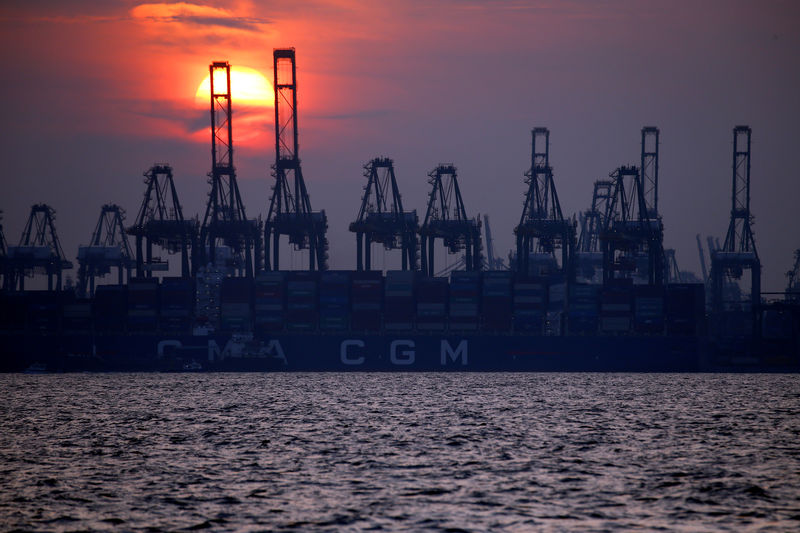By Aradhana Aravindan and Fathin Ungku
SINGAPORE (Reuters) - Last year, Singaporean chemicals factory boss Erman Tan took his employees on a cruise to the Malaysian island of Penang. This year, Tan says the best he can offer is to watch a video of the trip.
Singapore's economy is expected to grow at its slowest pace in a decade this year, and some experts are predicting a recession in 2020, as the U.S.-China trade war looks set to hit the export-reliant city-state harder than others in Southeast Asia.
This has prompted some economists to raise bets on the central bank easing monetary policy at its next meeting in October, or even out of cycle, especially if the U.S. Federal Reserve were to cut interest rates next month.
There is also speculation that the government could provide incentives to boost growth, but businesses like Tan's don't expect fiscal or monetary policy to be enough to arrest an economic decline that is mostly a result of a global slowdown.
"Many times you rely on yourself," said Tan, chief executive of Asia Polyurethane Manufacturing, which is cutting costs as customers in China hold back orders.
With revenues down 20 percent last year, his employees can forget about sailing around tropical islands.
"This year, we will watch the video like a virtual (experience). Let them put on goggles," he quipped.
To be sure, parts of the economy, such as construction and private consumption, have held up, supported by upward wage pressure from foreign worker restrictions and large long-term building projects.
But with exports equal to about 200% of Singapore's gross domestic product, a much larger weighting than those in neighboring Malaysia and Indonesia, bumping up domestic consumption is unlikely to meaningfully boost growth.
Singapore must expect some fallout from global trade disruption, Prime Minister Lee Hsien Loong told reporters in Bangkok over the weekend.
"You cannot just step on the gas and speed up and make up for a less favorable external environment," Lee said.
The uncertainty is prompting businesses to cut costs as they prepare for a drawn-out battle between the world's two biggest economies.
"No one wants to invest now, because they want to see what happens in the trade war," said John Kong, chief executive of building materials supplier M Metal, which employs 64 people.
Kong has asked his workers to turn off air-conditioning units when they leave for lunch and to stop printing in color.
NOT OUT OF THE WOODS
Singapore's economic data has been grim lately.
Electronics exports, a major driver of Singapore's growth over the past two years, saw their biggest decline in more than a decade, hit by a global downturn in the semiconductor industry, data showed last week.
Overall exports in May declined the most in more than three years as shipments to China slumped.
In the labor market, the number of retrenchments rose 40% in the first quarter of 2019 from a year ago, driven by cuts in the manufacturing sector, according to official data released this month.
The Monetary Authority of Singapore closely tracks data and there is a growing chance it may ease its currency-focused monetary policy for the first time in nearly three years.
Some say the central bank could even ease outside of its bi-annual meeting schedule as it did in January 2015 when it sought to counter deflationary pressures amid slowing growth.
But a more accommodative stance won't be enough to reinvigorate the economy, said CIMB Private Banking economist, Song Seng Wun, as a weaker Singapore dollar will not necessarily push up exports.
"Singapore businesses won't suddenly become so competitive that we are going to be selling a lot more of our goods and services," he said.
The finance ministry also has limited space to help given already-low tax rates, along with numerous incentives and cost offsets and an expansionary budget this year.
"The awkwardness is that the economy isn't really meant for huge additional infrastructure spending," said Rob Carnell, chief economist at ING.
"There's a lot of expenditure that goes on continuously in Singapore."
Further stimulus could come in the form of tax cuts and more rebates but factory operators aren't waiting for the government to come to their rescue.
"You, as the manufacturer, have to find a way to boost sales," said Sam Chee Wah, general manager at Feinmetall Singapore, whose products are used for testing semiconductor wafers, a component in microchips.
Sam says he's been bracing for a tech slowdown since last year - holding back hiring and major capital investments. He's now considering offering discounts or delayed payment terms to customers.
With U.S.-China hostilities showing no signs of abating, Singapore will have to weather the storm for some time to come.
"We are not out of the woods yet," said Sian Fenner, lead economist at Oxford Economics. "We haven't seen the worst."
(For a graphic on 'Singapore exports decline at fastest pace in three years' click https://tmsnrt.rs/2ZDV1s6)
